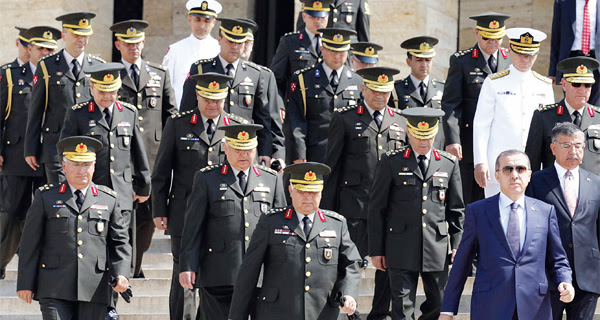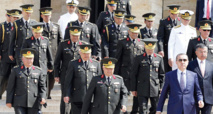The Syrian opposition, meanwhile, announced the formation of a delegation to attend a new round of UN-sponsored peace talks in Geneva on February 20.
IS has come under pressure from simultaneous offensives in both Syria and Iraq, where the group seized large swathes of territory in 2014 and proclaimed an Islamic "caliphate".
Erdogan, speaking in Istanbul, said Al-Bab "is now besieged from all fronts".
"Our forces entered the centre," he added, saying it was "only a matter of time" before the alliance of Turkish forces and rebels took control of the town.
"Daesh forces have begun leaving Al-Bab completely," he said, using an Arabic acronym for IS.
Turkish forces and allied rebels entered Al-Bab for the first time on Saturday, from the west, according to the Syrian Observatory for Human Rights.
The Britain-based monitor reported heavy clashes inside western Al-Bab on Sunday, as well as on the northern edge of the town, where Turkish forces and rebels were advancing but had not yet entered.
One Turkish soldier was killed and two soldiers wounded in clashes with IS, the Turkish Dogan news agency reported.
That raised to 67 the number of Turkish soldiers killed since Ankara began Operation Euphrates Shield in August, targeting both IS and the Kurdish YPG militia.
Al-Bab has been a key target for both Operation Euphrates Shield, but also Syrian government forces, and Ankara now finds itself effectively jointly besieging the town with President Bashar al-Assad's forces despite opposing his government.
Syria's army has advanced towards Al-Bab from the south, and on Monday severed the last road leading into the town, completing its encirclement.
Erdogan added that Al-Bab was "not our final target", hinting that Ankara may participate in the fight to recapture IS's de facto Syrian capital Raqa.
More than 310,000 people have been killed in Syria since the conflict began in March 2011 with anti-government protests, and successive rounds of peace talks have failed to produce a political solution.
Invitations to the new talks in Geneva have been delayed while the opposition forms its delegation.
On Sunday, the leading components of the political opposition announced a 21-member delegation, with a new delegation head and chief negotiator.
The delegation includes 10 rebel representatives, and will be headed by Nasr al-Hariri, a member of the National Coalition, a leading opposition body.
The chief negotiator was named as lawyer Mohamed Sabra, who replaces Mohamed Alloush of the Army of Islam rebel group.
Neither Alloush nor other Army of Islam figures were listed, though it was unclear if the faction was boycotting the talks or being represented by other officials.
No reason was given for there being a new delegation head and chief negotiator.
The umbrella High Negotiations Committee (HNC) which has represented the opposition at previous rounds of talks, described the delegation as inclusive.
It said it included for the first time representatives from two additional opposition groupings, known informally as the Moscow group and the Cairo group.
However, representatives from both groups denied they were part of the delegation.
In the past, the HNC has opposed the inclusion of the rival opposition groupings in its delegation, accusing members of the coalitions of being too flexible with regard to the Syrian government.
Ahead of the talks, Kazakhstan has invited Syrian rebels and government officials to Astana, where both sides met for talks that ended without any breakthrough last month.
Neither side has officially confirmed attendance at the February 15-16 Astana meeting.
UN envoy Staffan de Mistura is sending a "technical team" rather than participating personally.
The last round of talks in Astana was sponsored by regime allies Russia and Iran, along with Turkey, and Russian Foreign Minister Sergei Lavrov said Sunday Moscow was preparing for the new discussions in the Kazakh capital.
He said Moscow wanted to bring more rebels into the process and Jordan was helping on that front, adding that the talks were not meant to substitute for UN-led peace efforts.
On the ground meanwhile, Syrian state media said two civilians were killed Sunday by rebel rocket fire on government-held parts of the southern city of Daraa as opposition fighters launched a major operation.
The Observatory said at least 15 opposition fighters, including two Fateh al-Sham suicide bombers, were killed in the operation during which at least six members of the regime forces and allied fighters also died.
IS has come under pressure from simultaneous offensives in both Syria and Iraq, where the group seized large swathes of territory in 2014 and proclaimed an Islamic "caliphate".
Erdogan, speaking in Istanbul, said Al-Bab "is now besieged from all fronts".
"Our forces entered the centre," he added, saying it was "only a matter of time" before the alliance of Turkish forces and rebels took control of the town.
"Daesh forces have begun leaving Al-Bab completely," he said, using an Arabic acronym for IS.
Turkish forces and allied rebels entered Al-Bab for the first time on Saturday, from the west, according to the Syrian Observatory for Human Rights.
The Britain-based monitor reported heavy clashes inside western Al-Bab on Sunday, as well as on the northern edge of the town, where Turkish forces and rebels were advancing but had not yet entered.
One Turkish soldier was killed and two soldiers wounded in clashes with IS, the Turkish Dogan news agency reported.
That raised to 67 the number of Turkish soldiers killed since Ankara began Operation Euphrates Shield in August, targeting both IS and the Kurdish YPG militia.
- Turkey eyes Raqa operation -
Al-Bab has been a key target for both Operation Euphrates Shield, but also Syrian government forces, and Ankara now finds itself effectively jointly besieging the town with President Bashar al-Assad's forces despite opposing his government.
Syria's army has advanced towards Al-Bab from the south, and on Monday severed the last road leading into the town, completing its encirclement.
Erdogan added that Al-Bab was "not our final target", hinting that Ankara may participate in the fight to recapture IS's de facto Syrian capital Raqa.
More than 310,000 people have been killed in Syria since the conflict began in March 2011 with anti-government protests, and successive rounds of peace talks have failed to produce a political solution.
Invitations to the new talks in Geneva have been delayed while the opposition forms its delegation.
On Sunday, the leading components of the political opposition announced a 21-member delegation, with a new delegation head and chief negotiator.
The delegation includes 10 rebel representatives, and will be headed by Nasr al-Hariri, a member of the National Coalition, a leading opposition body.
The chief negotiator was named as lawyer Mohamed Sabra, who replaces Mohamed Alloush of the Army of Islam rebel group.
Neither Alloush nor other Army of Islam figures were listed, though it was unclear if the faction was boycotting the talks or being represented by other officials.
No reason was given for there being a new delegation head and chief negotiator.
- New Astana meeting -
The umbrella High Negotiations Committee (HNC) which has represented the opposition at previous rounds of talks, described the delegation as inclusive.
It said it included for the first time representatives from two additional opposition groupings, known informally as the Moscow group and the Cairo group.
However, representatives from both groups denied they were part of the delegation.
In the past, the HNC has opposed the inclusion of the rival opposition groupings in its delegation, accusing members of the coalitions of being too flexible with regard to the Syrian government.
Ahead of the talks, Kazakhstan has invited Syrian rebels and government officials to Astana, where both sides met for talks that ended without any breakthrough last month.
Neither side has officially confirmed attendance at the February 15-16 Astana meeting.
UN envoy Staffan de Mistura is sending a "technical team" rather than participating personally.
The last round of talks in Astana was sponsored by regime allies Russia and Iran, along with Turkey, and Russian Foreign Minister Sergei Lavrov said Sunday Moscow was preparing for the new discussions in the Kazakh capital.
He said Moscow wanted to bring more rebels into the process and Jordan was helping on that front, adding that the talks were not meant to substitute for UN-led peace efforts.
On the ground meanwhile, Syrian state media said two civilians were killed Sunday by rebel rocket fire on government-held parts of the southern city of Daraa as opposition fighters launched a major operation.
The Observatory said at least 15 opposition fighters, including two Fateh al-Sham suicide bombers, were killed in the operation during which at least six members of the regime forces and allied fighters also died.









 Home
Home Politics
Politics











